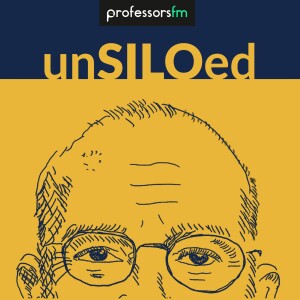
343. Shaking Up Wall Street with Disruptive Financial Strategies feat. Scott Patterson
 2023-10-13
2023-10-13
Does the financial world need a shake-up? By venturing into the minds of Nassim Taleb and Benoit Mandelbrot, two outliers who challenge the status quo of modern portfolio theory and efficient market hypothesis, we can find groundbreaking theories with implications for the financial sphere, especially in the face of unpredictable "Black Swan" events.
Scott Patterson is a journalist with The Wall Street Journal and also the author of Chaos Kings: How Wall Street Traders Make Billions in the New Age of Crisis, Dark Pools: The Rise of the Machine Traders and the Rigging of the U.S. Stock Market, and The Quants: How a New Breed of Math Whizzes Conquered Wall Street and Nearly Destroyed It, all of which factor into this episode.
Scott and Greg discuss the financial ups and downs of the stock market and traders who tried to ride the wave or predict when bubbles were going to burst. Scott talks about covering climate change for the Journal and the way it complicates predicting what start-ups will end up on top. Dive into the subtle and sometimes blurry distinctions between investing and gambling and find out what can make a company shut off its computers on this episode of UnSILOed.
*unSILOed Podcast is produced by University FM.*
Is climate change the big dog in the world of crises?
42:12: Climate change is what I write about in the journal—that's my beat—so I wanted the book (Chaos Kings: How Wall Street Traders Make Billions in the New Age of Crisis) to be not just about buying out-of- the-money options to protect your portfolio. I wanted it to be broader in terms of thinking about the risks that we face. And that's in the subtitle of the book, The New Age of Crisis, which I try to make an argument that we're entering a world of crises that are manifesting and overlapping more and magnifying the nature of the crisis. Some people call it the polycrisis, and climate, I think, is the big dog in that crisis world.
On the risk of high-speed contagion across markets
36:00: The risk of a high-speed contagion across markets is something we should be concerned about...[36:33] With high-speed trading, I was on the front lines there reporting it. It wasn't a well-known phenomenon. And I found it very alarming that the financial markets evolved into this race to trade microseconds faster than the next guy.
The inconvenient truth of ignoring fat tails
06:55: Nassim [Taleb] one time showed me an email that he'd gotten from a very well-known, respected academic in finance, who conceded to Nassim that, yes, we know that these fat tails exist, but our models don't work if we incorporate them into the models. And that's the problem: if you recognize that there is potential for three, four, five sigma events, then you have to put a fat tail into the model. And that's fine. But as long as the people running trading desks and executives understand that if you have a value-at-risk model, it's not capturing the real risk that you're going to be facing because it carves out 5 percent of the volatility, of the extreme volatility over a year.
Is high-speed computer trading a threat to financial markets?
38:32: In 2020, there were some extremely insane things going on in the markets, and I think probably negative oil prices and bonds. You couldn't buy a Treasury bond or sell a Treasury bond for a while at one point. Not normal. But I think a lot of that was not just an exogenous event: COVID was causing the global economy to seize up, and that moved into financial markets. Central bankers came in and threw a bunch of money at it, and cleaned out the pipes. But this idea of a high-speed computer-driven contagion is something I've always been concerned about, but I don't think we've seen that yet.
- Nassim Nicholas Taleb
- Benoit Mandelbrot
- Mark Spitznagel
- CalPERS
- Universa
- Recency Bias
- Empirica Capital
- Black Swan Theory
- Robert Litterman
- Fischer Black
- Professional Profile on Wall Street Journal
- Scott Patterson on LinkedIn
- Scott Patterson on X
- Chaos Kings: How Wall Street Traders Make Billions in the New Age of Crisis
- Dark Pools: The Rise of the Machine Traders and the Rigging of the U.S. Stock Market
- The Quants: How a New Breed of Math Whizzes Conquered Wall Street and Nearly Destroyed It
- Wall Street Journal Articles
- Muck Rack Articles
More Episodes
Create your
podcast in
minutes
- Full-featured podcast site
- Unlimited storage and bandwidth
- Comprehensive podcast stats
- Distribute to Apple Podcasts, Spotify, and more
- Make money with your podcast
It is Free
- Privacy Policy
- Cookie Policy
- Terms of Use
- Consent Preferences
- Copyright © 2015-2024 Podbean.com






